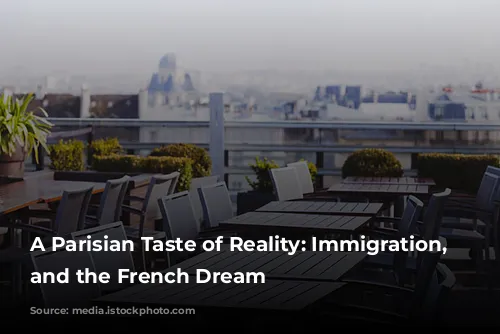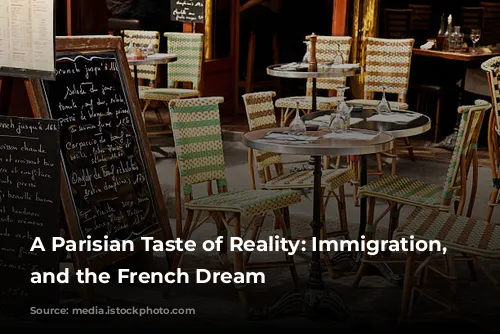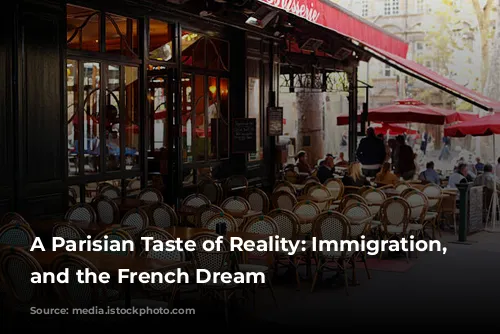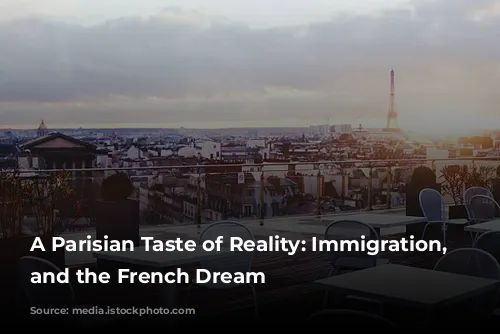In the heart of Paris, on the bustling Rue Bretagne, a lively scene unfolds. Le Pinardier, a charming bistro, thrives on the aroma of freshly baked bread and the clinking of glasses filled with local wines. The terrace, a haven for Parisian revelers, teems with patrons relishing the quintessential French experience of cheese, charcuterie, and conversation.
But behind the curtain of this idyllic Parisian scene, a hidden truth emerges: Le Pinardier’s success relies heavily on immigrant labor.
Meet Sazal Saha, a 24-year-old chef from Bangladesh, who has become an integral part of the bistro’s kitchen. He embodies the reality of the French hospitality industry, where immigrant workers play a vital role in fueling the nation’s culinary heart.

The Hidden Hands of the French Kitchen
Saha’s journey to becoming a chef in Paris is a testament to his dedication and the demand for skilled workers in the French food scene. Having trained in catering at the Joliet-Curie School, Saha embraces the challenges of his solitary role in Le Pinardier’s kitchen.
From purchasing produce to preparing meals, cleaning dishes, and ensuring a smooth operation, Saha’s dedication to the craft shines through. His passion for cooking, despite the long hours and demanding nature of the job, is palpable.
The French culinary landscape, especially in Paris, thrives on the contributions of immigrant workers. Statistics reveal that nearly a quarter of French cooks come from outside the European Union, with over half of Paris’s chefs being immigrants. They are the backbone of the city’s gastronomic scene, catering to both locals and tourists alike.
Florian Mousson, the owner of Le Pinardier, candidly acknowledges the pivotal role immigrants play in his business. He recognizes that without their tireless efforts, his bistro would struggle to survive. He stresses that immigrants are not simply filling in the gaps but are the driving force behind the success of many restaurants.
A Debate Over Immigration
However, the reliance on immigrant labor in the hospitality industry is entangled in the ongoing debate over immigration in France. The recent parliamentary elections have highlighted the rise of anti-immigration sentiment, with the far-right Rassemblement National (National Rally) gaining significant traction.
This political climate has cast a shadow of uncertainty over the future of immigrant workers like Saha. He worries about the potential for stricter immigration policies and their impact on his life in France.
The National Rally’s “France first” agenda, which advocates for stricter immigration controls and prioritizes French citizens in the social welfare system, has sparked anxiety among immigrant workers. They question the fairness of policies that potentially restrict their access to opportunity and belonging in a country they call home.
Finding Hope in the Future
Despite the anxieties, Saha’s dedication to his craft and his love for France remain unwavering. He is proud of his contributions to the Parisian culinary scene and is determined to continue building his life in the city he has come to call home.
Saha’s story highlights the complexities of immigration and its impact on the everyday lives of individuals. It underscores the vital role that immigrants play in shaping economies and communities while navigating the political landscape and the anxieties that come with it.
Le Pinardier, with its bustling terrace and savory dishes, stands as a testament to the interwoven tapestry of culture and cuisine in Paris. The stories of immigrant workers like Saha add a layer of human connection to the Parisian dining experience, reminding us that the richness of a city lies not just in its food, but in the people who create it.











